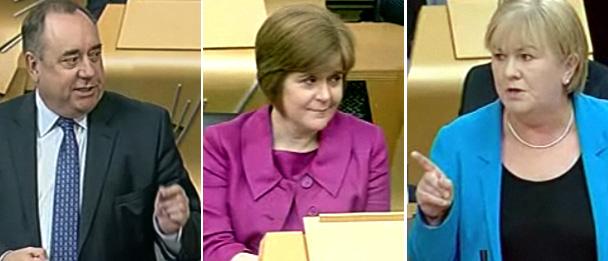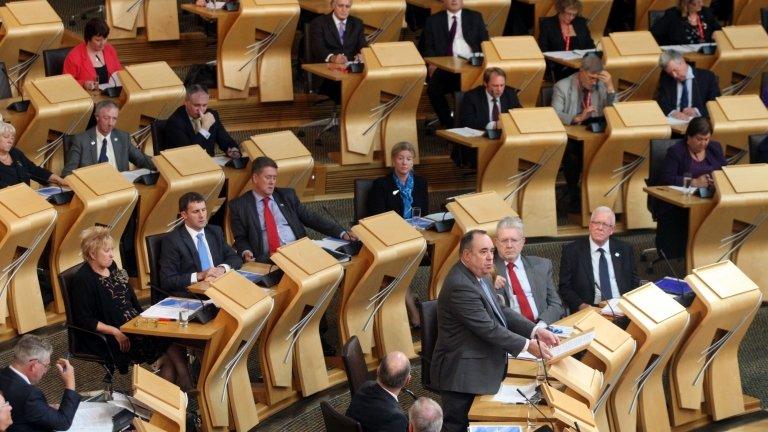A fundamental question
- Published
Beneath the rhetoric, below the oratory, alongside the drollery, there was a fundamental dispute lurking within the exchanges at First Minister's questions.
First, the rhetoric. That concerned the Ministerial reshuffle - and Labour's assertion that Nicola Sturgeon's new job, combining infrastructure development and the constitution, meant that the economy had been downgraded in the Scottish Government's thinking.
Actually, Labour's Johann Lamont sought at sundry points to argue that a snub had been delivered to both the economy and the NHS, Ms Sturgeon's former responsibility.
Not sure that works, logically. Is it to be thereby maintained that no reshuffle of ministerial responsibilities, that the health service must for ever and a day remain in the purlieu of the Deputy FM? Had health been dropped from Cabinet, different story - but it is now in the hands of a minister, Alex Neil, with a reputation for robustness.
But let us consider Ms Lamont's principal point - that economic regeneration is now to be a part-time concern for the minister in charge because so much of her time will be occupied in fighting for independence.
Mr Salmond has sundry rebuttals available and he deployed most of them. These are.....
that all ministers multi task
that Ms Sturgeon is comfortably capable of sharing these roles
that economic regeneration is at the core of every minister's remit, not least the Finance Secretary John Swinney
and that the SNP won the election, not Labour, and hence have a mandate to prepare for a referendum.
That argument swung back and forward. But now to that fundamental dispute.
In essence, Ms Lamont was going further than an argument about relative priorities. She was saying that zero importance should be attached to the referendum, that it was not in any way the priority of hard-pressed Scots, that it was instead an unwarranted obsession by the SNP.
In his turn, Mr Salmond was also making a fundamental point - which was that the push for independence was central to the search for ways of strengthening the economy.

Nicola Sturgeon [centre] remained silent as Alex Salmond and Johann Lamont entered into battle over her new job
He argued, in short, that ministers were pursuing a dual strategy, jointly focused on economic recovery, pursuing measures now within devolution to sustain jobs as far as possible while simultaneously seeking access to the much wider powers of a sovereign state.
To some extent, it might be said that Ms Lamont's argument is familiar. In different form, it was deployed by the Scottish Conservatives in office when they were trying to forestall demands for devolution. They too said that constitutional change was not a popular priority, that they did not encounter it as an issue on the doorsteps.
In response to that, Ms Lamont might argue that devolution was arguably "the settled will" of the Scottish people, to borrow a phrase from John Smith; that independence, by contrast, would appear to have relatively limited support.
In response once more, Mr Salmond might argue that the referendum is designed precisely to test the level of popular support for his party's policy, that it cannot be truly gauged until the debate is engaged and the plebiscite held.
The controversy over the reshuffle will, I suspect, subside. However, the fundamental argument will persist. Is independence and its attendant referendum an unwarranted and damaging diversion? Or is the path to long-term economic recovery?
- Published6 September 2012

- Published5 September 2012

- Published5 September 2012
- Published5 September 2012
